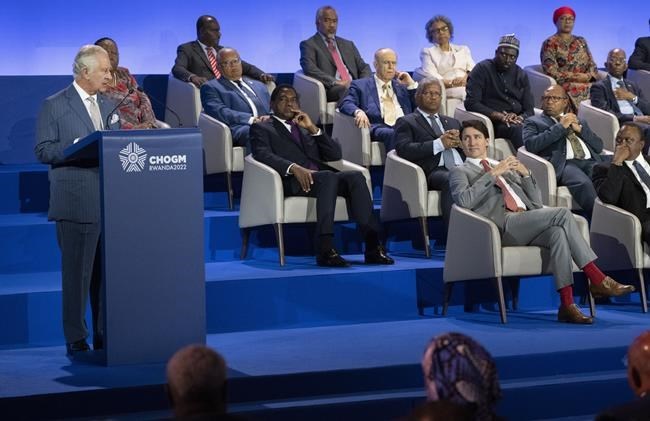KIGALI, Rwanda — Prince Charles pitched a new relationship between Commonwealth countries and the Crown on Friday, suggesting they can learn from efforts to reconcile with Indigenous Peoples in Canada, while Prime Minister Justin Trudeau worked to win over a divided group of leaders.
The Prince of Wales opened a meeting of Commonwealth heads of government in Kigali, the capital of Rwanda, by reflecting on the roots of the association that run deep into the African slave trade, which he called “the most painful period of our history.”
He offered Canada as an example to follow. He said he and his wife Camilla, Duchess of Cambridge, were deeply touched by Indigenous and non-Indigenous people in Canada reflecting honestly on the darkest parts of history during their visit to the country last month.
"As challenging as that conversation can be, people across Canada are approaching it with courage and unwavering commitment, determined to lay a foundation of respect and understanding upon which a better future can be built," Charles said during the opening ceremony.
"It seems to me that there are lessons in this for our Commonwealth family."
The Commonwealth, which is made up of 54 independent countries that are mostly former territories of the British Empire, finds itself at a crossroads involving both its people and its politics.
Charles was in Rwanda representing his mother, the Queen, and he is eventually expected to take over as head of the monarchy, and therefore the Commonwealth.
Though the heads of Commonwealth governments haven't met in four years because of the COVID-19 pandemic, several prominent leaders opted not to attend this week's meetings. That includes Indian Prime Minister Narendra Modi and South African President Cyril Ramaphosa, who both opted to attend a virtual summit with Russia, China and Brazil instead.
Newly elected Australian Prime Minister Anthony Albanese, whose government has been vocal about its aspirations to sever ties with the monarchy, also stayed home.
Foreign Affairs Minister Mélanie Joly said that's not something Canada is interested in pursuing.
"We know that monarchy is a source of stability," she told reporters. "There's so much instability in the world right now that Canadians expect us to deal with many other issues."
In his opening address, Charles told the assembly each country is free to determine its own constitutional relationship with the Crown, opening the door to countries like Australia whose governments aspire to form a republic.
He also highlighted that historic ties to the British monarchy are no longer a requirement of Commonwealth membership. Rwanda is not a former colony, but joined the association voluntarily in 2009.
The modern version of the Commonwealth was established as a collection of independent nations in 1949, just a few years before the Queen began her reign.
The Commonwealth Secretary-General Patricia Scotland referred to the Queen's vision for the Commonwealth in her address to the leaders. In the face of rising costs, world conflict, and the impacts of the global pandemic, Scotland said it is imperative the Queen's vision endures.
"It'll not be easy. We will have to dig deep," she said.
"We must trust each other. We must talk and listen to each other and give all that we have to, to achieve progress for the 2.5 billion people we all represent."
Meanwhile, Trudeau also attempted to sway the future direction of the Commonwealth in his own way, in a series of executive and bilateral meetings with his international counterparts.
He sat down for a one-on-one meeting with the Rwandan president and host of the summit, Paul Kagame, where Trudeau continued on the Prince of Wales' theme of confronting and overcoming the past and reflected on his visit to the Kigali Genocide Memorial.
He said he was privileged to visit the site, "but also to see how much Rwanda has developed over the past years.”
Trudeau's goal is to bring Commonwealth countries onside with Canada's climate goals and its view of the Russian invasion of Ukraine.
A planned sit-down with the chair of the commission that serves as the secretariat for the African Union, Moussa Faki Mahamat, was put off.
The African Union has been at the centre of a tug of war for support between Ukraine and Russia, as both countries vie for Africa's friendship while the violent conflict continues in Ukraine, leading to a worldwide spike in the cost of fuel and grain scarcity.
Trudeau also met with Antigua and Barbuda Prime Minister Gaston Browne who commended Canada's action on climate change, and newly elected Zambia President Hakainde Hichilema.
On Saturday, the leaders will attend a retreat for most of the day before closing the summit. Then Trudeau is expected to fly to Germany where he will attend the G7 in the Bavarian Alps.
This report by The Canadian Press was first published June 24, 2022.
Laura Osman, The Canadian Press



